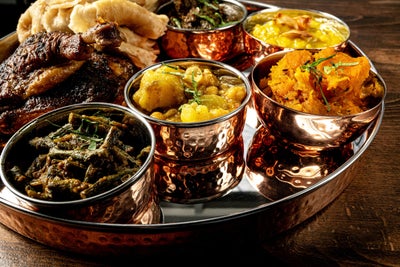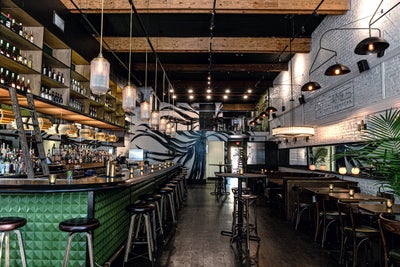
 By Kimberly Wilson ·Updated May 23, 2023
By Kimberly Wilson ·Updated May 23, 2023
In Washington D.C., there is no shortage of good food options. But when it comes to those that are special — few and far between. And St. James? What food critic dreams are made of.
Since it opened in May 2022, the Afro-Caribbean restaurant has captured the hearts of locals and transplants alike hoping for authentic food in the heart of the city. And Jeanine Prime has delivered on that promise.
The best part, there’s no such thing as the sophomore slump when it comes to Prime, also the owner of the Michelin-rated Cane on H Street NE. This tribute to Caribbean cuisine is a love letter to her roots, and the menu from the 67-seat eatery features a fusion of ingredients and cultural influences — plantains, okra, rice — a staple within the Diaspora; Chinese inspired stir fries and sauces; and curries and flatbread so good you’d think you were right in India.

The restaurateur who has a knack for building successful restaurants, began her career as an organizational psychologist before transitioning to the hospitality industry — a testament to her tenacity and embracing the “power of the pivot.” While holding senior research positions at Catalyst and Gartner, she oversaw the development of breakthrough research and insights that empower leaders and organizations to create inclusive workplaces.
Here, Prime shares her story, from what makes each restaurant special, to the Black Savannah chef she’d love to sit down and have dinner with.
How did you come up with the concept for the menu?
I worked closely with Emma Hernandez, our Head Chef at Cane, and Fiola Mare alum, now St. James’ Head Chef, Alfredo Romero Contreras, to design the menu. The inspiration for the menu comes primarily from the food I grew up eating in Trinidad and throughout the Caribbean. While there are distinct differences in the cuisines of each island, the shared histories of slavery and indentured servitude across the Caribbean have also created some notable commonalities in the culinary traditions that have emerged across the region.
For example, Callaloo, which we make as St. James with pureed spinach, chilies, coconut milk, and top with lump crab meat, is a dish that is enjoyed throughout the region, although the specific preparations vary from island to island. It’s a dish that is believed to be inspired by the Nigerian dish Efo riro. With the common Nigerian roots of many enslaved peoples across the Caribbean, it is not surprising to find recreations of this Nigerian staple across the region. The use of salt cod can also be traced to the shared history of slavery in the Caribbean. Low-grade salt cod (not deemed suitable for European markets) was introduced to the Caribbean as food for enslaved people. Across the Caribbean, this cheap ingredient was transformed into delicious salads spiked with chiles or served as fish cakes or fish fritters such as the Accras served at St. James with a culantro-chili aioli. Emma and Alfredo were and continue to be instrumental in transcribing these traditional homestyle recipes into the modern restaurant-quality dishes served at St. James today.
What are the main differences between Cane and St. James?
Cane is the more casual of my two restaurants and specifically highlights Trinidad’s East Indian food traditions. Cane’s menu features some of Trinidad’s most iconic street foods like doubles. St. James offers a more upscale casual dining experience with a lively vibe that evokes its namesake district in Port of Spain — an area known for its nightlife and diverse dining options.

Is there a big difference in comfort/soul food on the mainland (U.S.) versus the Islands?
Yes, there is. American Southern cuisine is very different from Caribbean cuisine. For example, in Trinidad, our food is influenced by African, Indian, French, Portuguese, and Chinese culinary traditions. This melting pot of ethnic influences on the cuisine makes it very distinct. However, there are some Trini dishes that are influenced by American cuisine, for instance, the macaroni pie on the St. James menu. Our version includes local seasonings like scotch bonnet chiles and pimentos, and we typically use noodles that are larger and longer than the elbow pasta that’s typically used in the American version. At St. James, we use penne because it’s the closest pasta shape to the original, which is the width of penne and the length of spaghetti.
What is the one ingredient you can’t live without when making Trinidadian cuisine?
Definitely green seasoning — it is the base of pretty much all of our food. It is a mixture of herbs like cilantro and broad leaf thyme, green onion, pimento peppers, and garlic.
If you could meet one chef and have dinner with them, who would it be and why?
I think it would be great to have dinner with Mashama Bailey, the executive chef of The Grey restaurant in Savannah, Georgia. She’s a Black woman utilizing southern cooking techniques, textures, and flavors to reimagine southern dishes. I admire her use of her culinary background and personal experiences to creatively represent southern food traditions, which resonates with my passion for reinventing how we present Caribbean cuisine at St. James. I think we’d have a great conversation about what that creative process is like, and the various ways that people react to new interpretations of beloved dishes.
How did the pandemic impact your businesses?
Like the rest of the industry, I had to pivot the business to fit and work within the limitations of the pandemic. Cane, which was a dine-in only establishment pre-pandemic, switched over to a take-out business model for over a year, offering our standard menu for lunch & dinner takeout as well as special family-sized meals. We leaned heavily on the support of the neighborhood to survive and truly are so thankful for the support we received. The pandemic also slowed down the opening of St. James; I had hoped to open the restaurant in late 2021 but due to industry-wide staffing and supply chain issues, we weren’t able to open our doors until May 2022.
The post Jeanine Prime Is Building A Restaurant Empire appeared first on Essence.
